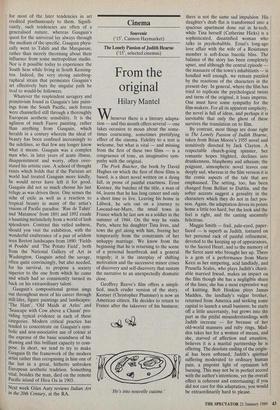Cinema
Souvenir ('15', Cannon Haymarket)
From the original
Hilary Mantel
Whenever there is a literary adapta- tion — and this month offers several — one takes occasion to moan about the some- times coarsening, sometimes prettifying effect of the cinema. Fidelity to a text is welcome, but what is vital — and missing from the first of these two films — is a congruence of tone, an imaginative sym- pathy with the original.
The Pork Butcher, the book by David Hughes on which the first of these films is based, is a short novel written on a dying fall, in prose of painful exactness. Ernst Kestner, the butcher of the title, a man of 64, learns that he has lung cancer and only a short time to live. Leaving his home in Liibeck, he sets out on a journey to Lascaud-sur-Marn, the small town in France which he last saw as a soldier in the summer of 1944. On the way he visits Paris, where his daughter Tina lives, and tows the girl along with him, freeing her temporarily from the constraints of her unhappy marriage. We know from the beginning that he is returning to the scene of a personal heartbreak and a general tragedy; it is the interplay of shifting motivation and the successive minor crises of discovery and self-discovery that sustain the narrative to an unexpectedly dramatic close.
Geoffrey Reeve's film offers a simpli- fied, much cruder version of the story. Kestner (Christopher Plummer) is now an American citizen. He decides to return to France after the takeover of his business; 'He's into nouvelle cuisine.' there is not the same sad impulsion. His daughter's drab flat is transformed into a spacious apartment done out in hi-tech, while Tina herself (Catherine Hicks) is a sophisticated, dissatisfied woman who talks in psychobabble. Ernst's long-ago love affair with the wife of a Resistance member is soft-focus bucolic bliss. The balance of the story has been completely upset, and although the central episode — the massacre of the town's inhabitants — is handled well enough, we remain puzzled by the reactions of the characters in the present day. In general, where the film has tried to replicate the psychological twists and turns of the original, it loses impetus. One must have some sympathy for the film-makers. For all its apparent simplicity, the novel is full of ideas, and perhaps it is inevitable that only the ghost of these survives the translation on to film.
By contrast, most things are done right in The Lonely Passion of Judith Hearne, taken from Brian Moore's 1955 novel and sensitively directed by Jack Clayton. A respectable church-going spinster, her romantic hopes blighted, declines into drunkenness, blasphemy and atheism; the poignant, atmospheric novel leaves one deeply sad, whereas in the film version it is the comic aspects of the tale that are emphasised. The setting, too, has been changed from Belfast to Dublin, and the softer accents suggest a geniality in the characters which they do not in fact pos- sess. Again, the adaptation drives its points home a little too hard; but the look and the feel is right, and the casting uncannily felicitous.
Maggie Smith — frail, pale-eyed, paper- faced — is superb as Judith, tortured on her personal rack of painful refinement, devoted to the keeping up of appearances, to the Sacred Heart, and to the memory of the fierce aunt who brought her up. There is a gem of a performance from Marie Keen as her simpering, acid landlady, and Prunella Scales, who plays Judith's charit- able married friend, makes an impact on the film though she has a negligible share of the lines; she has a most expressive way of knitting. Bob Hoskins plays James Madden, the landlady's vulgar brother, returned from America and seeking some capital to launch a small business; he starts off a little uncertainly, but grows into the part as the pitiful misunderstandings with Judith increase — for because of her old-world manners and ruby rings, Mad- den takes her for a woman of means, and she, starved of affection and attention, believes it is a marital partnership he is offering. The desolate ending of the origin- al has been softened, Judith's spiritual suffering moderated to ordinary human pain, a pinpoint light of optimism left burning. This may not be in perfect accord with the author's intentions, yet the overall effect is coherent and entertaining; if you did not care for this adaptation, you would be extraordinarily hard to please.


























































 Previous page
Previous page